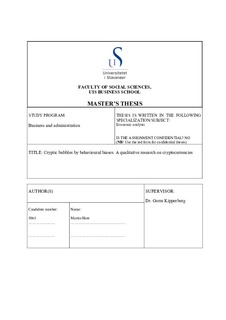Cryptic bubbles by behavioural biases?
Master thesis
Permanent lenke
http://hdl.handle.net/11250/2563460Utgivelsesdato
2018-06Metadata
Vis full innførselSamlinger
- Studentoppgaver (Business) [1035]
Sammendrag
The subject for this is elaborates around the new economic phenomenon of cryptocurrencies. The main objective will be to shed light on whether the market of cryptocurrencies is in fact an economic market bubble or not. The thesis first provide a detailed description of how cryptocurrencies work. As there are thousands of currencies on the market, with individual areas of usage or purposes, bitcoin is exemplified. It is notable that newer, more developed cryptocurrencies may have different tweaks to their technology which is not assessed in this thesis. The thesis then touches upon the ongoing discussion of whether cryptocurrencies should be considered as an actual currency or a speculative asset. The suggestion is the latter. Value of currencies is then discussed and touches upon issues of market manipulation.
The main part of the thesis investigates the bubble phenomenon by exploring the possibility of behavioural bias among investors, especially herding and overconfidence. The research is based on a qualitative approach using interviews of a selected group of informants. This way I, as the researcher, is allowed closer insight to the source of the research. The thesis then investigate why some investors choose to invest in cryptocurrencies while other do not. The research indicates that investors have separate assessments to both risk and return. This is then investigated further, concluding that behavioural biases affect investors investment decision in individual analysis of investors.
The research, based on relevant theory, finds evidence that behavioural biases affect investors decision of investing in cryptocurrencies. Investors evidently invest in the hope of further price increase in the future. As no fundamental value was calculated of the cryptocurrency market, the conclusion of the existence of a market bubble is actually inconclusive and only suggested through the evidence of behavioural biases.
Beskrivelse
Master's thesis in Economics

